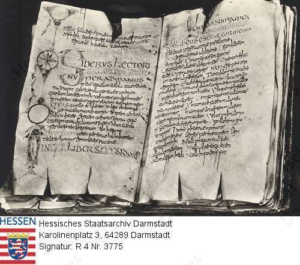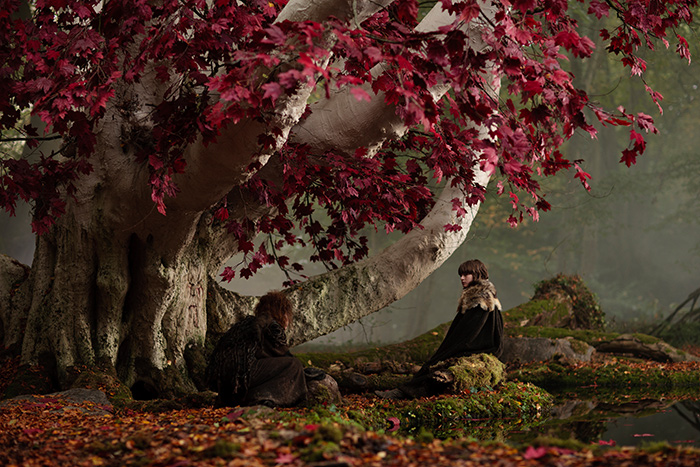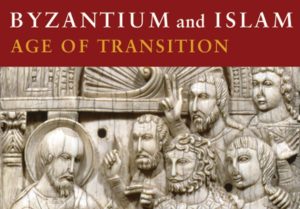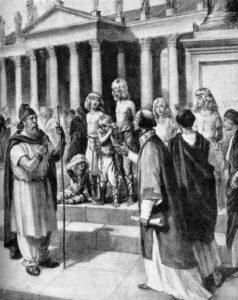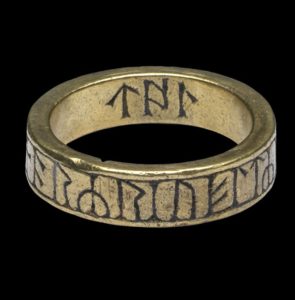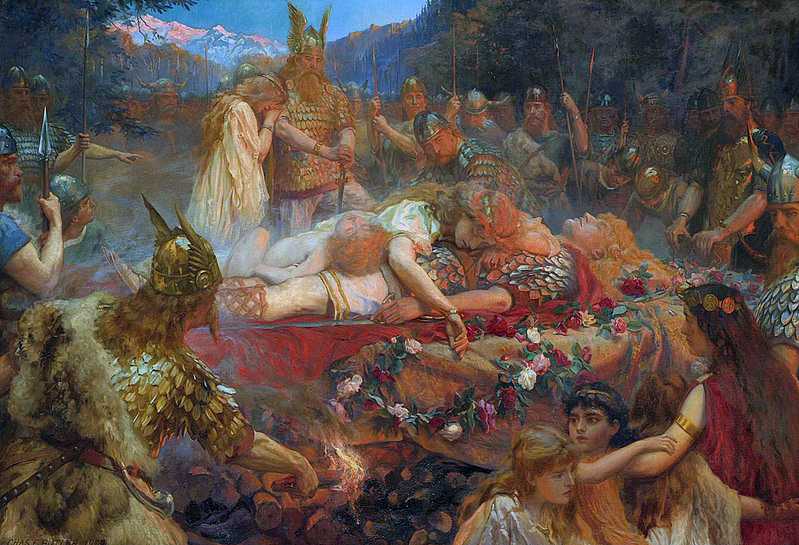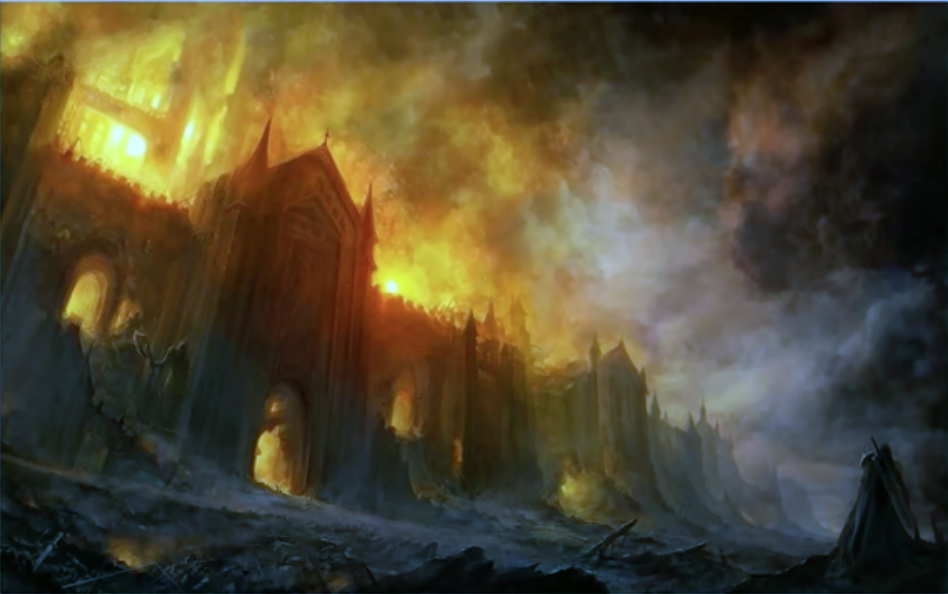Watch Martenson’s latest video here.
Month: March 2023
Dominion, 7
Or:
How the Woke monster originated
Tom Holland titles the next section of his book ‘Christendom’ (the previous section, ‘Antiquity’). The first chapter of this second section (‘Conversion: 754’) opens with vignettes from the life of a so-called saint:
As dawn broke, the camp on the banks of the river Boorne was already stirring. Boniface, its leader, was almost eighty, but as tireless as he had ever been. Forty years after his first journey to Frisia, he had returned there, in the hope of reaping from its lonely mudflats and marshes a great harvest of souls. Missionary work had long been his life. Born in Devon, in the Saxon kingdom of Wessex, he viewed the pagans across the northern sea as his kinsmen. In letters home he had regularly solicited prayers for their conversion. ‘Take pity upon them; for they themselves are saying: “We are of one blood and bone with you.”’ Now, after weeks of touring the scattered homesteads of Frisia, Boniface had summoned all those won for Christ to be confirmed in their baptismal vows. It promised him a day of joy.
The first boats arrived as sunlight was starting to pierce the early morning cloud. A mass of men, after clambering onto dry land, walked up from the river and approached the camp. Then, abruptly, the glint of swords. A charge. Screams. Boniface came out of his tent. Already it was too late. The pirates were in the camp. Desperately, Boniface’s attendants fought back. Not the old man himself, though. Christ, when he was arrested, had ordered Peter to put up his sword; and now Boniface, following his Lord’s example, commanded his followers to lay down their weapons. A tall man, he gathered his fellow priests around him, and urged them to be thankful for the hour of their release. Felled by a pirate’s sword, he was cut to pieces. So violently did the blows rain down that twice a book he had in his hands was hacked through. Found long afterwards at the scene of his murder, it would be treasured ever after as a witness to his martyrdom. [pages 201-202]
The book which Saint Boniface, the ‘Apostle of the Germans’, reputedly held up to defend himself from the swords of the Frisians who killed him (Hessisches Staatsarchiv Darmstadt). This image appears in Holland’s book.
It was not the inheritance of Roman imperialism that inspired them, but the example of Patrick and Columbanus. To experience hardship was the very point. Fearsome stories were told of what missionaries might face. Woden [Wotan], king of the demons worshipped by the Germans as gods, was darkly rumoured to demand a tithe of human lives. [page 203]
Let’s compare this demonised vision of Wotan with the Wotan we just saw in the Wagnerian tetralogy (and let’s remember that for the Christians who destroyed the statues of Apollo and other Greco-Roman gods, they also said they were ‘demons’).
In the Low Countries, prisoners were drowned beneath rising tides; in Saxony, hung from trees, and run through with spears. Runes were dyed in Christian blood. Or so it was reported. Such rumours, far from intimidating Anglo-Saxon monks, only confirmed them in their sense of purpose: to banish the rule of demons from lands that properly belonged to Christ.
As vividly as anyone, they understood what it was to be born again. ‘The old has gone, the new has come!’ The tone of revolution in Paul’s cry, the sense that an entire order had been judged and found wanting, still retained a freshness for men like Boniface in a way that it did not in more venerable reaches of the Christian world. [page 203]
In the following pages Holland talks about something we have already seen in our translation of Deschner’s books: the felling of the sacred tree of the Saxons (here). He added:
To banish the past, to overturn custom: here was a fearsome project, barely comprehensible to the peoples of other places, other times… Barely a decade after Boniface’s arrival in the Low Countries, missionaries had begun to calculate dates in the manner of Bede: anno Domini, in the year of their Lord. The old order, which to pagans had seemed eternal, could now more firmly be put where it properly belonged: in the distant reaches of a Christian calendar. While the figure of Woden bestowed far too much prestige on kings ever to be erased altogether from their lineages, monks did not hesitate to demote him from his divine status and confine him to the remote beginnings of things. The rhythms of life and death, and of the cycle of the year, proved no less adaptable to the purposes of the Anglo-Saxon Church. So it was that hel, the pagan underworld, where all the dead were believed to dwell, became, in the writings of monks, the abode of the damned; and so it was too that Eostre, the festival of the spring, which Bede had speculated might derive from a goddess, gave its name to the holiest Christian feast-day of all. Hell and Easter: the garbing of the Church’s teachings in Anglo-Saxon robes did not signal a surrender to the pagan past, but rather its rout. Only because the gods had been toppled from their thrones, melted utterly by the light of Christ, or else banished to where monsters stalked, in fens or on lonely hills, could their allure safely be put to Christian ends. The victory of the new was adorned with the trophies of the old. [page 204]
The old incarnation of this site featured a Weirwood tree, straight out of the novels of George R.R. Martin, as the symbol of The West’s Darkest Hour (scroll down to the very bottom of e.g. this PDF). Since the theme of this new incarnation doesn’t allow displaying images in a sidebar, the Weirwood image no longer appears. However, in my mind it is still the symbol of this site, and I would like to explain why.
As past visitors know, I began my literary career by writing several books about the tragedy in my family. Unlike other victims who have already died because of such tragedy—my sister and two of my first cousins—I realised that only by telling myself the deep past could I heal.
That meant delving into our biographical past with the work equivalent of several doctorates, and the result was my series From Jesus to Hitler. But once I developed the gift of seeing the family past in a very different way than the family normies see it—with all their denials and repressions—, I realised that I could use that ‘gift’ to begin to see the authentic past of the West.
That’s why Martin’s fiction about the Weirwood trees appealed to me so much. If a greenseer touched them, he could paranormally see into Westeros’s past (what parapsychologists call retrocognition). It struck me greatly that I used to touch the trunk of the big tree in our backyard the way, in the television version of Martin’s books, Bran the Broken touched the Weirwood trees—but I did that decades before Martin began his novels.
The difference, of course, is that in the real world retrocognition probably doesn’t exist, and as a kid I didn’t see the past paranormally. But I touched the tree just as Bran would do decades later on an HBO series, and as a teenager I sensed that there was something numinous about it.
In order not to make this autobiographical vignette too long, the tree symbolises seeing the past as it happened, not as the normies believe it happened. That’s why Goodrich’s book is first on my list in ‘Our Books’. And the second book shows us the true history of Greece, Rome and how the Judeo-Christians ended that culture. (After all, the books that saved me were made from material taken from trees.)
Touching the Weirwood tree is what saves us, as long as the person touching it is a greenseer. For this reason, both Boniface and the invaders in Martin’s prose, the first thing they did was cut down the sacred trees. Holland ends that section with the following paragraphs:
As well as the Pope, he [Boniface] had won the backing of Charles Martel. The Frankish warlord, no less keen to break the eastern marches to his own purposes than the Anglo-Saxon bishop, had found in Boniface a man after his own heart. Tortured though Boniface was by the need to curry favour at court, and by his frustrated yearning to save the souls of pagans, he had succeeded, by the end of his life, in shaping the churches east of the Rhine to something like his own image. Returning, in the last year of his life, to the mission that had always been closest to his heart, he had done so as the dominant figure in the Frankish church…
Yet even as Boniface was being cut down amid the reeds and mud of Frisia, the lead given by missionaries in the spread of Christianity eastwards was passing. A new and altogether more militant approach to paganism was being prepared. The willingness of Boniface to meet death rather than permit his attendants to draw their swords was not one that the Frankish authorities tended to share. Three days after his murder, a squad of Christian warriors tracked down the killers, cornered them and wiped them out. Their women and children were taken as slaves. [pages 206-207]
Or:
How the Woke monster originated
The following quotes are taken from the chapter ‘Exodus: 632’ of Dominion. Tom Holland begins by talking about something the Byzantine Emperor Heraclius did: forcefully baptise the Carthaginian Jews. As we have seen in my criticism of Richard Wagner from a week ago, this is a fatal error. The litmus test are the genes, as the Nazis well saw; not the faith. But even by the 7th century the values were already so inverted that race didn’t matter, only state ideology.
The site of the [Jerusalem] Temple had been converted into a rubbish tip, a dumping-ground for dead pigs and shit; Jews themselves—except for one day a year, when a delegation was permitted to climb Mount Moria, there to lament and weep—were banned from Jerusalem; legal restrictions on their civic status grew ever more oppressive. It was forbidden them to serve in the army; to own Christian slaves; to build new synagogues. In exchange, Jews were granted the right to live according to their own traditions—but only so that they might then better serve the Christian people as a spectacle and a warning. Now, with his abrupt new shift of policy, Heraclius had denied them even that. [page 180]
What is striking about this passage is what Eduardo Velasco, in his webzine Evropa Soberana, wrote in his master essay on the struggle between Rome and Jerusalem. Yahweh, interpreted psychologically, means a very iron will of the Hebrews. Initially, the republican Romans had the same will, Velasco tells us. But through the imperial centuries, and later due to Christian subversion, that will was diluted; leaving only the will of the Jews to survive as a people. Otherwise, the Greco-Romans would have maintained, clandestinely as the Jews did, the Aryan religion in the face of the destruction of their temples by the Christians.
So it was, in Carthage, that the emperor’s policy was punctiliously applied. Any Jew who landed in the city risked arrest and forcible baptism. All he had to do was cry out in Hebrew when twisting an ankle, or perhaps expose himself at the baths, to risk denunciation. [page 181]
Having to see the dicks of a kike to know that he is a kike only shows that, even since those times, Mediterranean miscegenation had already erased the emaciation line between Aryan and Semitic. From the time when such miscegenation was consummated Rome was lost; Christianity only institutionalized that genetic reality.
Holland then devotes several pages to the greatest historical event of that century: the irruption of Islam. It seems most natural to me that, once the Mediterranean lost the Nordic stock it still possessed during the Punic Wars, the sandniggers would rise and triumph over these Christian mudbloods.
In the event, two sieges were required to wrest Carthage from Christian rule. After the city had been captured the second time, and its inhabitants slaughtered or enslaved, its conqueror razed its buildings to the ground. The masonry was then loaded into wagons and carted along the bay. There, on a hill, stood the small town of Tunis. Long in the shadow of Carthage, its time had now come. The building of a new capital from the rubble of the old proclaimed the triumph of Islam in one of the strongholds of the Christian West: the home of Cyprian, of Donatus, of Augustine. Such a thing was not meant to happen. For many centuries, the Christians of Africa had tended the flame of their faith. Just as the Israelites had followed Moses through the desert, so had they, members of the pilgrim Church, been guided through the centuries by the Holy Spirit. But now a new people, warriors who themselves claimed to be on an exodus, had seized the rule of Africa; and the Africans, for the first time in four hundred years, found themselves under the rule of masters who scorned the name of Christian. As in Jerusalem, so in Tunis, the conquerors did not hesitate to proclaim that a new revelation, God-given and uncorrupted, had superseded the old. It was not churches that were built out of the demolished walls and columns of Carthage, but places of worship called by the Arabs masajid: ‘mosques’. [187-188]
Just as the devastation of Rome didn’t cause any cognitive dissonance to Pope Gregory, mentioned in the previous entry, at this point Europeans were no longer capable of questioning the Christian theocracy when suffering these calamities. We can already imagine the fate the Arabs would have faced before genetically pure, pagan Romans discovering both the scientific method and industrial, military technology. In a nutshell, no Christian takeover of the pagan world, no Islam. (See Deschner’s book in the featured post that shows how the Church took it upon itself to destroy all the classical knowledge accumulated over the centuries.)
Holland then provides an overview of how England came to be, repudiating its pagan past:
It was, however, conveniently located for Rome; and it was from Rome, back in 597, that a band of monks sent by Pope Gregory had arrived in Kent. Britain, the home of Pelagius and Patrick, boasted ancient Christian roots; but many of these, in the centuries following the collapse of Roman rule, had either withered or been pulled up and trampled underfoot. Germanic-speaking warlords, carving out kingdoms for themselves, had seized control of the richest third of the island. Calling themselves variously Angles, or Saxons, or Jutes, they had been proudly and swaggeringly pagan. Rather than accept the Christianity of the conquered natives, as the Franks had done, they had scorned it. All the same, they had kept a careful eye on the world beyond their shores. They had been alert to the potency of Frankish kingship, and to the allure of Rome. When the Pope’s emissary arrived in Britain, he had been given a cautious welcome. The king of Kent, after contemplating the mysteries revealed to him by Augustine, and weighing up the various opportunities that acceptance of them promised, had submitted to baptism. Over the following decades, a succession of other warlords across eastern Britain had done the same. [pages 188-189]
The Anglo-Saxon tribes, like the Germanic ones, never had such a firm will to perpetuate themselves as Hitler would have. The reason for this is that a religion had not yet emerged which had the Aryan race as its basic principle, as National Socialism had. It is vital to understand that both Eduardo Velasco and William Pierce erred in considering Sparta the paradigm to emulate. History tells us loudly that only the Germany of the Third Reich understood the laws of life to the point of elaborating a State that complied with them. Using the metaphor of the recent series on the Nibelung ring, only Hitler had the will to return it to the river nymphs. The rest of the Aryans wanted to have power by possessing it (remember: the Wagnerian tetralogy ends in tragedy).
In the next few pages Holland talks about an Anglian monk, Bede, but I would just like to focus on a single passage:
Bede used, though, what he could. Why had Gregory sent a mission to be the salvation of his people? Because, so Bede reported, he had seen blond-haired boys for sale in Rome’s market and, struck by their beauty, asked from where they came; then, on being told that the slaves were Angles, made a fateful pun. ‘It is fitting,’ he said, ‘for their faces are those of angels—and so they should properly share with the angels an inheritance in heaven.’ [page 192]
On this site, I have already quoted a few words from the preface to Thomas Hubbard’s book, Homosexuality in Greece and Rome, a preface that I read online. I have to get a hard copy and read it all because I get the impression that sexually abusing children by an institution didn’t start in the classical world but in Christendom.
In time, the Saxons and the Jutes would indeed come to think of themselves as sharing a single identity with the Angles—and even to accept their name. Their kingdoms, following their union, would be known as Anglia and, in their own language, Englalonde. Just as the inheritance of scripture had inspired a momentous new configuration of identities in the Near East, so also in Britain. The elements of Exodus, so evident in the stories that Muslims told of their origins, were shaping, at the far end of the world, the cocoon of myth in which another people were being formed: the English. [page 193]
The last pages of the chapter are devoted to the rise of the Franks.
Even as Poitiers was being fought, collections of sayings attributed to Muhammad were being compiled that, in due course, would come to constitute an entire corpus of law: Sunna… The Talmud, an immense body of law compiled by Jewish scholars—rabbis—in the centuries prior to the Arab conquest of the Near East, had never threatened the inheritance of Paul’s teachings as the Sunna did… Few, if any, who fought at Poitiers would have realised it, but at stake in the battle had been nothing less than the legacy of Saint Paul.
‘For you are a chosen people, a royal priesthood, a holy nation, a people belonging to God.’ The Pope, when he quoted this line of scripture in a letter to Pepin, was not merely flattering the Franks, but acknowledging a brute reality. Increasingly, it was the empire ruled by the heirs of Charles Martel—the Carolingians—that defined for the papacy the very character of Christian rule. Paul I, unlike his predecessors, had failed to notify the emperor in Constantinople of his election. Instead, he had written to Pepin. The Byzantines, struggling for survival as they were against relentless Muslim onslaughts, appeared to Christians in Rome—let alone in Francia or Northumbria—an ever more alien and distant people. Even more spectral were the lands that for centuries had constituted the great wellsprings of the Christian faith: Syria and Palestine, Egypt and Africa. The days when a man like Theodore might freely travel from Tarsus to Canterbury were over. The Mediterranean was now a Saracen sea. Its waters were perilous for Christians to sail. The world was cut in half. An age was at an end. [pages 197-198]
If Judeo-Christianity first flourished in Syria and Palestine, Egypt and Africa, it is clear that we are not talking about an Aryan religion for the consumption of pure Aryans, but a mudblood religion for the consumption of mudbloods.
Watch Mike Maloney’s video on the dollar’s coffin nails.
Dominion, 5
Or:
How the Woke monster originated
A soothsayer lay buried nearby who, according to Homer, had interpreted the will of Apollo to the Greeks, and instructed them, at a time when the archer god had been felling them with his plague-tipped arrows, how to appease his anger. Times, though, had changed. In 391, sacrifices had been banned on the orders of a Christian Caesar. Apollo’s golden presence had been scoured from Italy. Paulinus, in his poetry, had repeatedly celebrated the god’s banishment. Apollo’s temples had been closed, his statues smashed, his altars destroyed. By 492, he no longer visited the dreams of those who slept on the slopes of Gargano… In 391, the endemic aptitude of the Alexandrian mob for rioting had turned on the Serapeum and levelled it; four decades later, the worship of Athena had been prohibited in the Parthenon. [pages 159-160]
By the end of the fifth century, it was only out in the wildest reaches of the countryside, where candles might still be lit besides springs or crossroads, and offerings to time-worn idols made, that there remained men and women who clung to ‘the depraved customs of the past’. Bishops in their cities called such deplorables pagani: not merely ‘country people’, but ‘bumpkins’. The name of ‘pagan’, though, had soon come to have a broader application. Increasingly, from the time of Julian onwards, it had been used to refer to all those—senators as well as serfs—who were neither Christians nor Jews. It was a word that reduced the vast mass of those who did not worship the One God of Israel, from atheist philosophers to peasants fingering grubby charms, to one vast and undifferentiated mass…
Certainly no Christian could imagine that it was enough merely to have closed down their temples. The forces of darkness were both cunning and resolute in their evil. That they lurked in predatory manner, waiting for Christians to fail in their duty to God, sniffing out every opportunity to seduce them into sin, was manifest from the teachings of Christ himself. His mission, so he had declared, was to ‘drive out demons’. [page 161]
Five pages later Holland speaks of a remarkable pope:
Gregory, though, had no illusions as to the scale of Rome’s decline. A city that at its peak had boasted over a million inhabitants now held barely twenty thousand. Weeds clutched at columns erected by Augustus; silt buried pediments built to honour Constantine. The vast expanse of palaces, and triumphal arches, and race-tracks, and amphitheatres, constructed over the centuries to serve as the centre of the world, now stretched abandoned, a wilderness of ruins. Even the Senate was no more. [page 166]
The rhythms of the city—its days, its weeks, its years—had been rendered Christian. The very word religio had altered its meaning: for it had come to signify the life of a monk or a nun. Gregory, when he summoned his congregation to repentance, did so as a man who had converted his palace on the Caelian into a monastery, who had lived there as a monk himself, pledged to poverty and chastity, a living, breathing embodiment of religio. The Roman people, hearing their new pope urge them to repentance, did not hesitate to obey him. Day after day, they walked the streets, raising prayers and chanting psalms. Eighty dropped dead of the plague as they went in procession. Then, on the third day, an answer at last from the heavens. The plague-arrows stopped falling. The dying abated. The Roman people were spared obliteration…
Gregory, when he sought to make sense of the calamities being visited on Italy, turned above all to the Book of Job. Its hero, given through no fault of his own into the hands of Satan, and plunged into abject wretchedness, had endured his sufferings with steadfast fortitude. Here, so Gregory argued, was the key to understanding the shocks of his own age. Satan was abroad again. Just as Job had been cast into the dust, so now were the blameless suffering disaster alongside sinners. [pages 167-168]
Some pages later the author introduces us to the subject of how Christian eschatology began to be understood:
The new Jerusalem and the lake of fire were sides of the same coin. For the earliest Christians, a tiny minority in a world seething with hostile pagans, this reflection had tended to provide reassurance. The dead, summoned from their graves, where for years, centuries, millennia they might have been mouldering, would face only two options. The resurrection of their physical bodies would ensure an eternity either of bliss or torment. The justice that in life they might either have been denied or evaded would, at the end of days, be delivered them by Christ. Only the martyrs, those who had died in their Saviour’s name, would have been spared this period of waiting. They alone, at the moment of death, were brought by golden-winged angels in a great blaze of glory directly to the palace of God. All others, saints and sinners alike, were sentenced to wait until the hour of judgement came. This, though, was not the vision of the afterlife that had come to prevail in the West. There, far more than in the Greek world, the awful majesty of the end of days, of the bodily resurrection and the final judgement, had come to be diluted. That this was so reflected in large part the influence—ironically enough—of an Athenian philosopher. ‘When death comes to a man, the mortal part of him perishes, or so it would seem. The part which is immortal, though, retires at death’s approach, and escapes unharmed and indestructible.’ So had written Plato, a contemporary of Aristophanes and the teacher of Aristotle. No other philosopher, in the formative years of the Western Church, had exerted a profounder influence over its greatest thinkers. Augustine, who in his youth had classed himself as a Platonist, had still, long after his conversion to Christianity, hailed his former master as the pagan ‘who comes nearest to us’. That the soul was immortal; that it was incorporeal; that it was immaterial: all these were propositions that Augustine had derived not from scripture, but from Athens’ greatest philosopher. Plato’s influence on the Western Church had, in the long run, proven decisive. [pages 171-172]
I have always been suspicious of Plato and Aristotle for the simple fact that they were the pagan philosophers that Christianity spared in the Middle Ages. What did all those pagans whose works disappeared with the destruction of the Library of Alexandria have to say?
Monks who knelt for hours in sheeting rain, or laboured on empty stomachs at tasks properly suited to slaves, did so in the hope of transcending the limitations of the fallen world. The veil that separated the heavenly from the earthly seemed, to their admirers, almost parted by their efforts. ‘Mortal men, so people believed, were living the lives of angels.’ Nowhere else in the Christian West were saints quite as tough, quite as manifestly holy, as they were in Ireland.
That the island had been won for Christ was a miracle in itself. Roman rule had never reached its shores. Instead, sometime in the mid-fifth century, Christianity had been preached there by an escaped slave. Patrick, a young Briton kidnapped by pirates and sold across the Irish Sea, was revered by Irish Christians not just for having brought them to Christ, but for the template of holiness with which he had provided them. Whether working as a shepherd, or fleeing his master by ship, or returning to Ireland to spread the word of God, angels had spoken to him, and guided him in all he did; nor had he hesitated, when justifying his mission, to invoke the imminence of the end of the world. A century on from Patrick’s death, the monks and nuns of Ireland still bore his stamp. They owed no duty save to God, and to their ‘father’—their ‘abbot’. Monasteries, like the ringforts that dotted the country, were proudly independent. [pages 173-174]
The infinite mendacity of Christianity is particularly noticeable in Ireland. It is known that the average Irish person has a relatively low IQ compared to the European countries with the highest IQ. It was sheer stupidity to inject seminal chalice into the asses of the novices, instead of impregnating the Irish women. The Catholic vows of celibacy resulted in the poor monks burning themselves internally, trying to calm their impetus with the cloistered ephebes: a dysgenesis opposite to what the Jews have been done for centuries. Even rabbis marry, promoting eugenics that has led them to conquer the highest IQ.
An iron discipline served to maintain them. Only a rule that was ‘strict, holy and constant, exalted, just and admirable’ could bring men and women to the dimension of the heavenly. Monks were expected to be as proficient in the strange and book-learned language of Latin as at felling trees; as familiar with the few, ferociously cherished classics of Christian literature that had reached Ireland as toiling in a field. Like Patrick, they believed themselves to stand in the shadow of the end days; like Patrick, they saw exile from their families and their native land as the surest way to an utter dependence upon God. Not all headed for the gale-lashed isolation of a rock in the Atlantic. Some crossed the sea to Britain, and there preached the gospel to the kings of barbarous peoples who still set up idols and wallowed in paganism: the Picts, the Saxons, the Angles. Others, heading southwards, took ship for the land of the Franks.
Columbanus—‘the Little Dove’—arrived in Francia in 590: the same year that Gregory was elected pope. The Irish monk, unlike the Roman aristocrat, came from the ends of the earth, without status, without pedigree; and yet, by sheer force of charisma, he would set the Latin West upon a new and momentous course. Schooled in the ferociously exacting monasticism of his native land, Columbanus appeared to the Franks a figure of awesome and even terrifying holiness. [pages 174-175]
This [eternity], when supplicants ventured through the woods that surrounded Luxeuil and approached the settlement founded by Columbanus, was what they hoped to find. The very wall that enclosed the monastery, raised by the saint’s own hand, proclaimed the triumph of the City of God over that of man. The shattered fragments of bath-houses and temples had been built into its fabric: pillars, pediments, broken statuary. These, converted to the uses of religio, were the bric-à-brac of what Augustine, two centuries previously, had identified as the order of the saeculum. [page 177]
No surprise, then, that in time the wings of the most powerful angel of them all should have been heard beating golden over Columbanus’ native land. Almost certainly, it was Irish monks studying in Bobbio who brought home with them the cult of Saint Michael. From Italy to Ireland, the charisma of the warrior archangel came to radiate across the entire West. [page 178]
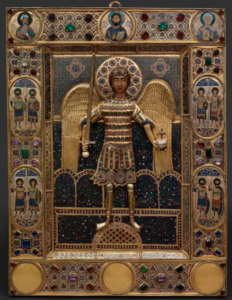 An icon depicting the Archangel Michael in St Mark’s Basilica, Venice, 11th century. This image appears in Holland’s book.
An icon depicting the Archangel Michael in St Mark’s Basilica, Venice, 11th century. This image appears in Holland’s book.
The real ring
Dominion, 4
Or:
How the Woke monster originated
For previous instalments of this series, see here, here and here.
When I first read Nietzsche when I was seventeen, I was very confused. At the time I wanted to rebel against my father’s traumatic Catholicism the way normies did and still do: through modern freethinker thought. I didn’t understand why Nietzsche fulminated against believers and non-believers alike. As a teenager, I never imagined that even the most militant atheists were still, axiologically, Christian.
I didn’t start to understand Nietzsche until, alarmed by the Islamisation of Europe, I read the aggregations of a Swede that I would eventually collect in the entry ‘The red giant’ (to honour Nietzsche, since 2021 this article has been available in German). The following quotes from Holland’s Dominion are taken from the chapter ‘Charity: AD 362’:
The shock of this cut Flavius Claudius Julianus [Emperor Julian] to the quick. The nephew of Constantine, he had been raised a Christian, with eunuchs set over him to keep him constant in his faith. As a young man, though, he had repudiated Christianity—and then, after becoming emperor in 361, had committed himself to claiming back from it those who had ‘abandoned the ever-living gods for the corpse of the Jew’. A brilliant scholar, a dashing general, Julian was also a man as devout in his beliefs as any of those he dismissively termed ‘Galileans’. Cybele was a particular object of his devotions. It was she, he believed, who had rescued him from the darkness of his childhood beliefs. Unsurprisingly, then, heading eastwards to prepare for war with Persia, he had paused in his journey to make a diversion to Pessinus. What he found there appalled him. Even after he had made sacrifice, and honoured those who had stayed constant in their worship of the city’s gods, he could not help but dwell in mingled anger and despondency on the neglect shown Cybele. Clearly, the people of Pessinus were unworthy of her patronage. Leaving the Galatians behind, he did as Paul had done three centuries before: he wrote them a letter.
‘My orders are that a fifth be given to the poor who serve the priests, and that the remainder be distributed to travellers and to beggars.’ Julian, in committing himself to this programme of welfare, took for granted that Cybele would approve. Caring for the weak and unfortunate, so the emperor insisted, had always been a prime concern of the gods. [pages 137-138]
One of the problems with us apostates from the Christian faith is that we fail to realise that this mania for helping the dispossessed is also Christian, even in non-Christian contexts. On this site, I have generally spoken well of Emperor Julian, but like all apostates, he probably never realised that, axiologically, he was still a Christian…
The heroes of the Iliad, favourites of the gods, golden and predatory, had scorned the weak and downtrodden. So too, for all the honour that Julian paid them, had philosophers. The starving deserved no sympathy… The young emperor, sincere though he was in his hatred of ‘Galilean’ teachings, and in regretting their impact upon all that he held most dear, was blind to the irony of his plan for combating them: that it was itself irredeemably Christian. ‘How apparent to everyone it is, and how shameful, that our own people lack support from us, when no Jew ever has to beg, and the impious Galileans support not only their own poor, but ours as well.’ [page 139]
The reversal of Greco-Roman values was already taking place at the time of the reign of the house of Constantine, i.e. the descendants or relatives of the first Christian emperor.
The wealthy, men who in previous generations might have boosted their status by endowing their cities with theatres, or temples, or bath-houses, had begun to find in the Church a new vent for their ambitions. This was why Julian, in a quixotic attempt to endow the worship of the ancient gods with a similar appeal, had installed a high priest over Galatia and urged his subordinates to practise poor relief. Christians did not merely inspire in Julian a profound contempt; they filled him with envy as well. [page 140]
There was no human existence so wretched, none so despised or vulnerable, that it did not bear witness to the image of God. Divine love for the outcast and derelict demanded that mortals love them too… ‘The bread in your board belongs to the hungry; the cloak in your wardrobe to the naked; the shoes you let rot to the barefoot; the money in your vaults to the destitute.’ The days when a wealthy man had only to sponsor a self-aggrandising piece of architecture to be hailed a public benefactor were well and truly gone. [pages 140-141]
In the following pages, Holland informs us that the quixotic Emperor Julian perished fighting the Persians, and gives us further evidence of how values were reversed:
And if so, then Martin—judged by the venerable standards of the aristocracy in Gaul—represented a new and disconcerting breed of hero: a Christian one. Such was the very essence of his magnetism. He was admired by his followers not despite but because of his rejection of worldly norms. Rather than accept a donative from Julian, he had publicly demanded release from the army altogether. ‘Until now it is you I have served; from this moment on I am a servant of Christ.’ Whether indeed Martin had truly said this, his followers found it easy to believe that he had… By choosing to live as a beggar, he had won a fame greater than that of any other Christian in Gaul… [pages 146-147]
No longer was Greco-Roman statuary, which so beautifully displayed the superb Aryan beauty, the benchmark for honouring the Aryan Gods. Now that the god of the Jews was in charge, it was necessary to admire their antithesis:
The first monk in Gaul ever to become a bishop, he was a figure of rare authority: elevated to the heights precisely because he had not wanted to be. Here, for anyone bred to the snobbery that had always been a characteristic of Roman society, was shock enough. Yet it was not only the spectacle of a smelly and shabbily dressed former soldier presiding as the most powerful man in Tours that had provoked a sense of a world turned upside down, of the last becoming first… As a soldier, though, he did have his heavy military cloak; and so, taking out his sword, he cut it in two, and gave one half to the beggar. No other story about Martin would be more cherished; no other story more repeated. This was hardly surprising. The echo was of a parable told by Jesus himself. The setting, as recorded in Luke’s gospel… [pages 147-149]
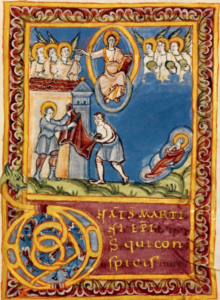 This image in a museum in Bamberg, Germany, which also appears in full colour in Holland’s book, shows Christ watching Martin sharing his cloak with a beggar. Holland then takes us to the year 394 to discuss the conduct of a billionaire, Meropius Pontius Paulinus:
This image in a museum in Bamberg, Germany, which also appears in full colour in Holland’s book, shows Christ watching Martin sharing his cloak with a beggar. Holland then takes us to the year 394 to discuss the conduct of a billionaire, Meropius Pontius Paulinus:
Paulinus would present himself as a visual reproach to their extravagance. Pale from his sparse diet of beans, and with his hair roughly cropped like a slave’s, his appearance was calculated to shock. His body odour too. In an age when there existed no surer marker of wealth than to be freshly bathed and scented, Paulinus hailed the stench of the unwashed as ‘the smell of Christ’. [page 151]
As Hitler saw, Christianity was a religion that introduced spiritual terror into the Aryan soul. In the following paragraphs Holland explains the causes of such behaviour in a Roman who would once have used his wealth to honour Aryan beauty:
…he [Paulinus] far preferred another passage from the gospels. The story had been told by Jesus of a rich man, Dives, who refused to feed a beggar at his gates named Lazarus. The two men died. Dives found himself in fire, while Lazarus stood far above him, by Abraham’s side… Such was the fate that haunted Paulinus—and that he was resolved at all costs to avoid. [page 153]
In the final pages of the chapter, Holland informs us how the church reacted, thanks to the rationalisations of its African theologian, St Augustine, to reconcile the church’s love of riches with these Gospel passages. Yet Holland informs us that Clovis, the founder of the Merovingian dynasty, used to pray to St Martin: something which shows that even the most powerful warlord was already bowing down to a so-called saint.
Bailouts will devalue the dollar
Watch YouTube interview here.
Brunhild’s immolation
When Siegfried fell, pierced by Hagen’s weapon, everyone looked at each other in astonishment. No one could explain the iniquitous act of the prince’s half-brother. Only the prince knew the murderer’s intentions. Under the pretext of avenging Brunhild, Hagen was killing the hero by wounding him in the back. Gunther did not agree with this sinister plan, but he was too weak to oppose the decisions of his devious half-brother. When he saw his stepbrother finally achieve his purpose, he could not hide his regret. He was convinced of Siegfried’s innocence. He knew that it had all happened because of the loss of the hero’s memory, caused by the filter that Hagen poured into the wine that Gutrune offered to the guest the day after his arrival when they prepared the intrigue.
The prince gave the order to bring the hero’s body to the palace. The march through the forest was slow. Before the funeral procession reached its destination, Hagen announced it with his hunting horn.
Gutrune waited for the sound of Siegfried’s horn to follow.
A few moments passed, and the waiting became anxious. With a horrible thought, the princess went out to meet the retinue and rushed weeping over the hero’s body. Then, standing before Gunther, she rebuked him fiercely:
“How could you do this, brother, to avenge the outrage done to your betrothed wife, you have killed the man who loved me!”
With a sad accent, the prince replied:
“Disbelieve yourself, sister: there was no outrage at all. Brunhild could not be my betrothed, for she was already Siegfried’s wife. All this is the work of our half-brother. The evil filter he poured into the wine you offered our guest caused him to lose all memory of his past. But he fell in love with you and offered to win his own wife for me. Having lost his memory, he acted like a blind child. So do not speak of revenge. I had no part in Siegfried’s death. I am incapable of such cowardly action as you suppose.”
At that moment Hagen stepped forward and said in a firm and imperious tone:
“No revenge was the motive for the hero’s death. A wild boar rammed him from behind and stuck its tusk into him.”
“You were the boar, traitor!” Gunther burst out then, at the height of despair. “You wounded him from behind to carry out your sinister plans! But you won’t get away with it, wretch! You will not seize the magic ring!”
“The ring is mine,” said Hagen. “It belongs to me by inheritance. It belonged to my father, Alberich; it was craftily taken from him by Wotan, and now I, his son, have it back; and it can never be taken from me!”
“You will not touch the hero’s hand!” said Gunther, standing up before his half-brother, as the latter, with the fury of a wild boar, thrust his sword through his chest, killing him. Gunther fell heavily, to the horror of his sister Gutrune.
At the sight of the prince’s fall, the bystanders made ready to take up their weapons, but Hagen stopped them with a resounding voice:
“With this sword, I will defend my rights; woe to him who dares to oppose my designs! He shall fall as Siegfried fell, and as my half-brother fell; no foe shall escape my hatred and the strength of my arm, now that I wield this invincible sword!”
The warriors, overpowered by the imperious tone of Alberich’s son, drew back in fear, while Gutrune continued to shed bitter tears over the corpse of her beloved.
Brunhild appeared, who had seen and heard everything from inside the palace. With slow steps, she approached the group with the expression of a sleepwalker.
Before the Valkyrie reached Siegfried’s body, Hagen tried to tear the ring from Siegfried’s finger. But the hero’s hand was raised threateningly, and the evil one recoiled in terror.
Amid the general stupor, Brunhild’s voice rose solemnly:
“Let the wailing and weeping to cease! gather together the oldest and most stout trunks! Light the most gigantic pyre that ages have seen, so that the glow of the flames that are to consume Siegfried’s body may reach Valhalla, and with the ruin of the divine abode bring about the twilight of the gods!”
When the first tongues of flame reached the hero’s corpse, Brunhild climbed up to the place where the body had been laid and took the magic ring. Turning to the waves of the river, on the banks of which the pyre was burning, the Valkyrie said aloud:
“Listen, daughters of the Rhine, listen! Soon the ring forged from the gold that has been taken from you will return to you. I will put it on my finger, and when my body, together with Siegfried’s, turns to ashes, advance over the remains of the bonfire and drag us all down into the murmuring waters…”
For long night hours, the logs burned. When the ashes of the hero’s and the Valkyrie’s bodies mingled with the last remnants of the burning logs, the waves of the Rhine surged towards the pyre.
Hagen, who had been attentive, rushed forward in search of the ring before the waters carried it away. But at that moment the Rhine daughters rushed forward and swept him to the bottom of the river. Thus perished Hagen, the evil genius, swallowed by the waters, along with the ashes of Siegfried and Brunhild.
As the Valkyrie had foretold, the flames from the pyre reached the heavenly heights and set Valhalla on fire. The gods could do nothing to save the divine abode. Wotan watched the hurricane of destructive fire grow and pondered the causes and reasons for this ruinous end.
The perfidy of men had also taken hold of the minds and hearts of the gods. He himself had been unjust, driven more than once by anger. Now he saw Valhalla collapsing, consumed by the fire of evil passions. With the last glow of the fire in the high abode of the gods, the gods were entering their final decline. The darkened world had only the hope of a new dawn.
